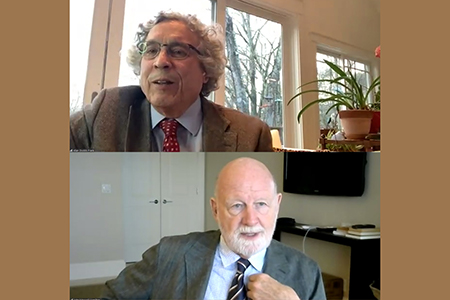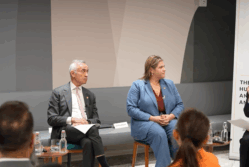Event Coverage Highlight

John Maxwell Hamilton Examines the Birth and Legacy of American Propaganda
 by Chad Bouchard
by Chad Bouchard
In April 1917, just two weeks after the United States joined World War I, President Woodrow Wilson launched a mass propaganda agency with unchecked power and sweeping influence to support the war and mislead the public. A new book by OPC member John Maxwell Hamilton examines the history of the Committee on Public Information, known as the CPI, how its legacy “managed to shoot propaganda through every capillary of the American blood system,” and set the stage for U.S. government media manipulation over the last century.
On April 16, Hamilton discussed the book, Manipulating the Masses: Woodrow Wilson and the Birth of American Propaganda, with OPC Past President Allan Dodds Frank.
Hamilton, an OPC member since 2010, has reported from more than four dozen countries, served as the first dean of the Manship School of Mass Communication at Louisiana State University, and is a Global Fellow at the Woodrow Wilson Center for International Scholars and a Senior Associate at the Center for Strategic and International Studies.
Under the direction of progressive muckraker George Creel, the CPI quickly became a domestic and international publishing conglomerate that produced pamphlets, cartoons, posters, syndicated features, branding for nearly 100 organs of government, and many thousands of press releases. The committee also produced films and photographic slides and dispatched a force of 75,000 so-called “Four Minute Men,” locally recruited presenters who would speak during the changing of reels at movie theaters, as well as county fairs and other public spaces.
All of this was carried out using a war fund with no congressional oversight and no consent from taxpayers, which in retrospect makes the CPI an unconstitutional program, Hamilton said.
“There was censorship, there was coercion, they were tendentious, the used fear and appealed to emotion. There were front organizations that had no apparent attachment to the CPI but in fact were its mouthpieces, and they were involved in disinformation.”
The agency only lasted until the end of the war in 1919 but left an indelible influence that continues today, Hamilton said.
Notable CPI alumni went on to influential careers in journalism and public relations, including Arthur Bullard, who ran the CPI’s Russia Division and established a basis for Soviet-American relations; Carl Ackerman, a renowned correspondent who went on to become the founding dean of the Columbia School of Journalism; Edward “Colonel” House, an American diplomat who worked undercover as a journalist for both the Saturday Evening Post and The New York Times, Ernest Poole, author of Blind, A Story of These Times; and Walter Lippmann, a reporter and commentator sometimes called the “father of modern journalism,” who is attributed as introducing the concept of the Cold War.
Hamilton said while later developments such as CIA involvement with journalists during the Cold War, and journalists becoming disillusioned with government during the Vietnam War, World War I and the creation of the CPI stands as an earlier and often forgotten “disillusioning moment” in the history of American journalism.
“We now have some laws for governing what presidents can do with information. But they’re inadequate, almost meaningless in many cases, and they’re rarely applied. Of course, the reason they can’t be applied is partly because the apparatus to apply them is under the aegis of the White House,” Hamilton said.
He said today’s technology gives the U.S. presidents much more power than they had in Wilson’s era, while the number of journalists covering Washington has declined.
“There’s a real story to tell here about how we need to fence back the power of chief executives to use our money to tell us what to think.”
Click the window below to watch a playlist of video clips from the program, or watch the whole program here.



